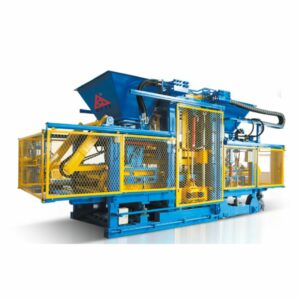Block machines are machines used to manufacture concrete blocks, which are used in construction projects for building walls, pavements, and other structures. Block machines come in a variety of types and configurations, depending on the production capacity and the type of blocks they are designed to produce.
Here are some common types of block machines:
Manual block machine: Manual block machines are operated by hand and are typically used for small-scale production of blocks. They are simple to operate and require minimal maintenance, but have a lower production capacity than automated machines.
Semi-automatic block machine: Semi-automatic block machines are partially automated and require some manual intervention. They are typically used for medium-scale production of blocks and can produce a variety of block types.
Fully automatic block machine: Fully automatic block machines are fully automated and require minimal manual intervention. They are typically used for large-scale production of blocks and can produce high volumes of blocks with consistent quality.
Block machines typically consist of a hopper for storing raw materials, a mixer for mixing the raw materials, a conveyor belt for transferring the mixture to the block machine, and a block machine for shaping the mixture into blocks. Some machines may also include a palletizer for stacking and organizing the blocks.
Block machines are known for their high production rates and consistent quality of output. They are also highly efficient and cost-effective because they require minimal human intervention and can operate continuously for long periods. China block machines Additionally, they can produce a wide range of block sizes, shapes, and colors, and can be customized to meet specific production requirements.
Common types of blocks produced by block machines include hollow blocks, solid blocks, paving blocks, and interlocking blocks. Block machines can also produce specialized blocks with unique features such as insulation, soundproofing, and fire resistance, depending on the specific requirements of the construction project.
There are several advantages of using block machines over traditional methods for manufacturing concrete blocks.
Here are some of the main advantages:
Increased production efficiency: Block machines can produce a large volume of blocks in a short amount of time. This is because they are fully automated and require minimal human intervention, which increases production efficiency and reduces labor costs.
Consistent block quality: Block machines produce blocks with consistent and uniform quality, which is essential for construction projects that require precise dimensions and specifications. This is because the machines are designed to mix the raw materials in a consistent manner, ensuring that each block is of the same quality.
Customizable block shapes and sizes: Block machines can be customized to produce blocks in various shapes and sizes, depending on the specific requirements of the construction project. This flexibility allows for greater design options and can help to reduce costs by minimizing waste.
Lower production costs: Block machines are cost-effective because they require minimal labor, energy, and raw materials to produce blocks. This translates to lower production costs and higher profit margins for manufacturers.
Environmentally friendly: Block machines produce minimal waste and use less energy than traditional methods, making them a more environmentally friendly option for producing concrete blocks.
Overall, block machines offer several advantages over traditional methods for producing concrete blocks. They are cost-effective, efficient, and produce high-quality blocks that meet the precise requirements of construction projects. Additionally, they can be customized to produce a wide range of block shapes and sizes, providing greater design options for architects and builders.
